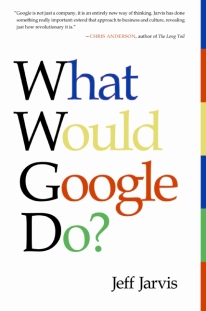Federal News Radio 1500 AM Book Club: “What Would Google Do?” coming up on Friday
Just a reminder that you still have a few days to read Jeff Jarvis’s “What Would Google Do?” which is the Federal News Radio Book Club book for...
Just a reminder that you still have a few days to read Jeff Jarvis’s “What Would Google Do?” which is the Federal News Radio Book Club book for March.
First, the details:
 Our discussion will take place Friday, March 13 on Federal News Radio 1500 AM’s In Depth with Francis Rose at 2p ET.
Our discussion will take place Friday, March 13 on Federal News Radio 1500 AM’s In Depth with Francis Rose at 2p ET.
In addition to Rose and myself, we will be talking to Jarvis… also joining the discussion will be Frank DiGiammarino, the vice president of strategic initiatives for the National Academy of Public Administration and one of the creators of the National Academy’s Collaboration Project.
The Federal News Radio Book Club is something akin to the Oprah book club — but we talk about books that help feds do their jobs better. So unlike other book clubs, our “meetings” take place on the radio — Federal News Radio 1500 AM. And we’d love to hear your thoughts about the book, questions that you’d like to raise, ideas that you think worked for you — and ones that didn’t. You can send Rose or me a message … or even better, share your on our Facebook page for this edition of the Federal News Radio Book Club, where other people can share your thought and ideas.
Second, some pre-reading…
If you don’t have time to read the book, you can listen to our conversation with Jarvis on Federal News Radio 1500 AM’s Daily Debrief with Chris Dorobek and Amy Morris . But you can read the Cliff Notes version — the Jan. 29 issue of BusinessWeek magazine ran excerpts of the book — including excerpts of the section on government headlined The United States of Google.
But BusinessWeek also featured a “What Would Google Do?” management tip sheet.
Among the principles that Jarvis outlines in his book:
* give up control;
* get out of the way;
* make mistakes well.
These three are particularly useful for government — they are almost directly applicable to government management — and will be particularly challenging.
* Give up control
Jarvis argues that Google doesn’t try to be everything for everybody. To the contrary, it tries to link to everybody. Government agencies tend to want to control the information. They get concerned about people misinterpreting the information that is presented. These days, people don’t want to be controlled. They want to search for the information they want — they want to Google it — and that means giving up control of the data.
* Get out of the way
This is related to giving up control, but too often, agencies feel that they have to do everything. It isn’t true. And there are two illustrations of that: The District of Columbia’s remarkable Apps for Democracy program … but then there was also the Environmental Protection Agency. Jeremy Ames of EPA’s Indoor Environments Division came up with the idea of holding a contest for radon public service announcement videos. Rather then contracting it out, people submitted their own videos — and the results were remarkable. But just as powerful, the video initiative spurred people impacted by radon gas to form their own social network outside of EPA. Essentially, the EPA got out of the way. And it all started with a video. Simple, but powerful.
* Make mistakes well
This is one of the most difficult aspects for agencies — and the most disconcerting currently. The government is terrible at making mistakes. Nobody tolerates them — not Congress, not those involved with oversight… not even the press. It has created a ultra-conservative culture that is intolerant of any change and innovation. What would Google do? Beta test everything. G-mail is still in beta, for goodness sake. That is largely because they are still making changes. Amazon.com CEO Jeff Bezos was recently on PBS’s Charlie Rose Show and he was talking about the ability to make mistakes and how important it is to the culture of that company. Specifically, he pointed to Amazon’s attempt at auctions, which failed. But he noted that Amazon now has a successful business selling with third-party vendors. That business would have never come about without the auction failure. Make mistakes well.
I think you will enjoy the book and it will help you see things in different ways — agree or disagree with what it says. I’d love to hear both. What ideas work in government — and which done — and why?
I hope you’ll join us on Federal News Radio 1500 AM’s InDepth with Francis Rose on Friday, March 13 at 2p ET.
Copyright © 2025 Federal News Network. All rights reserved. This website is not intended for users located within the European Economic Area.





